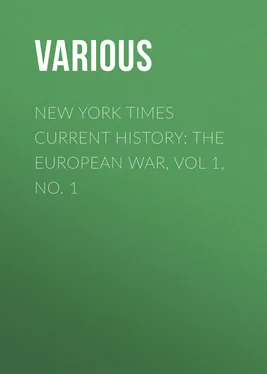Various - New York Times Current History - The European War, Vol 1, No. 1
Здесь есть возможность читать онлайн «Various - New York Times Current History - The European War, Vol 1, No. 1» — ознакомительный отрывок электронной книги совершенно бесплатно, а после прочтения отрывка купить полную версию. В некоторых случаях можно слушать аудио, скачать через торрент в формате fb2 и присутствует краткое содержание. Жанр: foreign_edu, periodic, История, на английском языке. Описание произведения, (предисловие) а так же отзывы посетителей доступны на портале библиотеки ЛибКат.
- Название:New York Times Current History: The European War, Vol 1, No. 1
- Автор:
- Жанр:
- Год:неизвестен
- ISBN:нет данных
- Рейтинг книги:4 / 5. Голосов: 1
-
Избранное:Добавить в избранное
- Отзывы:
-
Ваша оценка:
- 80
- 1
- 2
- 3
- 4
- 5
New York Times Current History: The European War, Vol 1, No. 1: краткое содержание, описание и аннотация
Предлагаем к чтению аннотацию, описание, краткое содержание или предисловие (зависит от того, что написал сам автор книги «New York Times Current History: The European War, Vol 1, No. 1»). Если вы не нашли необходимую информацию о книге — напишите в комментариях, мы постараемся отыскать её.
New York Times Current History: The European War, Vol 1, No. 1 — читать онлайн ознакомительный отрывок
Ниже представлен текст книги, разбитый по страницам. Система сохранения места последней прочитанной страницы, позволяет с удобством читать онлайн бесплатно книгу «New York Times Current History: The European War, Vol 1, No. 1», без необходимости каждый раз заново искать на чём Вы остановились. Поставьте закладку, и сможете в любой момент перейти на страницу, на которой закончили чтение.
Интервал:
Закладка:
How the Nation Took It.
The moment he said that we could not "stand aside with our arms folded" and see our friend and neighbour France "bombarded and battered," the whole nation rose to applaud him. All the Foreign Office distrust of public opinion, the concealment of the Anglo-French plan of campaign, the disguise of the Entente in a quaker's hat, the duping of the British public and the Kaiser with one and the same prevarication, had been totally unnecessary and unpopular, like most of these ingenuities which diplomatists think subtle and Machiavellian. The British Public had all along been behind Mr. Winston Churchill. It had wanted Sir Edward to do just what Sazonoff wanted him to do, and what I, in the columns of The Daily News proposed he should do nine months ago (I must really be allowed to claim that I am not merely wise after the event), which was to arm to the teeth regardless of an expense which to us would have been a mere fleabite, and tell Germany that if she, laid a finger on France we would unite with France to defeat her, offering her at the same time as consolation for that threat, the assurance that we would do as much to France if she wantonly broke the peace in the like fashion by attacking Germany. No unofficial Englishman worth his salt wanted to snivel hypocritically about our love of peace and our respect for treaties and our solemn acceptance of a painful duty, and all the rest of the nauseous mixture of school-master's twaddle, parish magazine cant, and cinematograph melodrama with which we were deluged. We were perfectly ready to knock the Kaiser's head off just to teach him that if he thought he was going to ride roughshod over Europe, including our new friends the French, and the plucky little Belgians, he was reckoning without old England. And in this pugnacious but perfectly straightforward and human attitude the nation needed no excuses because the nation honestly did not know that we were taking the Kaiser at a disadvantage, or that the Franco-Russian alliance had been just as much a menace to peace as the Austro-German one. But the Foreign Office knew that very well, and therefore began to manufacture superfluous, disingenuous, and rather sickening excuses at a great rate. The nation had a clean conscience, and was really innocent of any aggressive strategy: the Foreign Office was redhanded, and did not want to be found out. Hence its sermons.
Mr. H.G. Wells Hoists the Country's Flag.
It was Mr. H.G. Wells who at the critical moment spoke with the nation's voice. When he uttered his electric outburst of wrath against "this drilling, trampling foolery in the heart of Europe" he gave expression to the pent-up exasperation of years of smouldering revolt against swank and domineer, guff and bugaboo, calling itself blood and iron, and mailed fist, and God and conscience and anything else that sounded superb. Like Nietzsche, we were "fed up" with the Kaiser's imprisonments of democratic journalists for Majestaetsbeleidigung (monarch disparagement), with his ancestors, and his mission, and his gospel of submission and obedience for poor men, and of authority, tempered by duelling, for rich men. The world had become sore-headed, and desired intensely that they who clatter the sword shall perish by the sword. Nobody cared twopence about treaties: indeed, it was not for us, who had seen the treaty of Berlin torn up by the brazen seizure of Bosnia and Herzegovina by Austria in 1909, and taken that lying down, as Russia did, to talk about the sacredness of treaties, even if the wastepaper baskets of the Foreign Offices were not full of torn up "scraps of paper," and a very good thing too; for General von Bernhardi's assumption that circumstances alter treaties is not a page from Machiavelli: it is a platitude from the law books. The man in the street understood little or nothing about Servia or Russia or any of the cards with which the diplomatists were playing their perpetual game of Beggar my Neighbour. We were rasped beyond endurance by Prussian Militarism and its contempt for us and for human happiness and common sense; and we just rose at it and went for it. We have set out to smash the Kaiser exactly as we set out to smash the Mahdi. Mr. Wells never mentioned a treaty. He said, in effect: "There stands the monster all freedom-loving men hate; and at last we are going to fight it." And the public, bored by the diplomatists, said: "Now you're talking!" We did not stop to ask our consciences whether the Prussian assumption that the dominion of the civilized earth belongs to German culture is really any more bumptious than the English assumption that the dominion of the sea belongs to British commerce. And in our island security we were as little able as ever to realize the terrible military danger of Germany's geographical position between France and England on her west flank and Russia on her east: all three leagued for her destruction; and how unreasonable it was to ask Germany to lose the fraction of a second (much less Sir Maurice de Runsen's naïve "a few days' delay") in dashing at her Western foe when she could obtain no pledge as to Western intentions. "We are now in a state of necessity; and Necessity knows no law," said the Imperial Chancellor in the Reichstag. "It is a matter of life and death to us," said the German Minister for Foreign Affairs to our Ambassador in Berlin, who had suddenly developed an extraordinary sense of the sacredness of the Treaty of London, dated 1839, and still, as it happened, inviolate among the torn fragments of many subsequent and similar "scraps of paper." Our Ambassador seems to have been of Sir Maurice's opinion that there could be no such tearing hurry. The Germans could enter France through the line of forts between Verdun and Toul if they were really too flustered to wait a few days on the chance of Sir Edward Grey's persuasive conversation and charming character softening Russia and bringing Austria to conviction of sin. Thereupon the Imperial Chancellor, not being quite an angel, asked whether we had counted the cost of crossing the path of an Empire fighting for its life (for these Militarist statesmen do really believe that nations can be killed by cannon shot). That was a threat; and as we cared nothing about Germany's peril, and wouldn't stand being threatened any more by a Power of which we now had the inside grip, the fat remained in the fire, blazing more fiercely than ever. There was only one end possible to such a clash of high tempers, national egotisms, and reciprocal ignorances.
Delicate Position of Mr. Asquith.
It seemed a splendid chance for the Government to place itself at the head of the nation. But no British Government within my recollection has ever understood the nation. Mr. Asquith, true to the Gladstonian tradition (hardly just to Gladstone, by the way) that a Liberal Prime Minister should know nothing concerning foreign politics and care less, and calmly insensible to the real nature of the popular explosion, fell back on 1839, picking up the obvious barrister's point about the violation of the neutrality of Belgium, and tried the equally obvious barrister's claptrap about "an infamous proposal" on the jury. He assured us that nobody could have done more for peace than Sir Edward Grey, though the rush to smash the Kaiser was the most popular thing Sir Edward had ever done.
Besides, there was another difficulty. Mr. Asquith himself, though serenely persuaded that he is a Liberal statesman, is, in effect, very much what the Kaiser would have been if he had been a Yorkshireman and a lawyer, instead of being only half English and the other half Hohenzollern, and an anointed emperor to boot. As far as popular liberties are concerned, history will make no distinction between Mr. Asquith and Metternich. He is forced to keep on the safe academic ground of Belgium by the very obvious consideration that if he began to talk of the Kaiser's imprisonments of editors and democratic agitators and so forth, a Homeric laughter, punctuated with cries of, "How about Denshawai?" "What price Tom Mann?" "Votes for women!" "Been in India lately?" "Make McKenna Kaiser," "Or dear old Herbert Gladstone," etc., etc., would promptly spoil that pose. The plain fact is that, Militarism apart, Germany is in many ways more democratic in practice than England; indeed the Kaiser has been openly reviled as a coward by his Junkers because he falls short of Mr. Asquith in calm indifference to Liberal principles and blank ignorance of working-class sympathies, opinions, and interests.
Читать дальшеИнтервал:
Закладка:
Похожие книги на «New York Times Current History: The European War, Vol 1, No. 1»
Представляем Вашему вниманию похожие книги на «New York Times Current History: The European War, Vol 1, No. 1» списком для выбора. Мы отобрали схожую по названию и смыслу литературу в надежде предоставить читателям больше вариантов отыскать новые, интересные, ещё непрочитанные произведения.
Обсуждение, отзывы о книге «New York Times Current History: The European War, Vol 1, No. 1» и просто собственные мнения читателей. Оставьте ваши комментарии, напишите, что Вы думаете о произведении, его смысле или главных героях. Укажите что конкретно понравилось, а что нет, и почему Вы так считаете.











